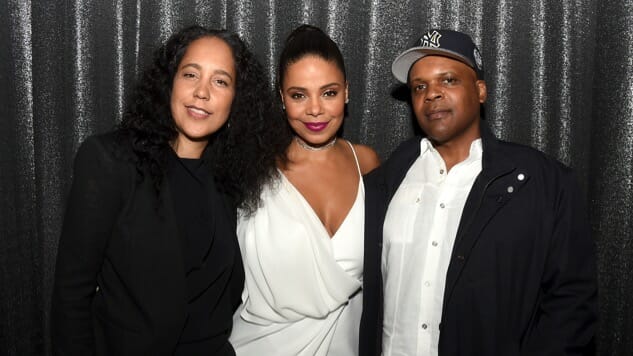All Heart, Body and Politics: Sanaa Lathan, Gina Prince-Bythewood and Reggie Bythewood Talk Shots Fired
Kevin Winter/Getty Images
The first writer of the new series Shots Fired had no idea he’d inspire a powerful show about the social, political and personal aftermath of two shootings in a small Southern town. Gina Prince-Bythewood and Reggie Bythewood’s son (who was 12 at the time) wrote a story about Trayvon Martin and Emmet Till, and the couple was moved to create a project that would speak to some of the themes he’d brought up. The young Bythewood seems to already be inheriting his parents’ special knack for creating political work that comes from the heart. And with Shots Fired, starring Sanaa Lathan, Stephan James and Helen Hunt, the Bythewoods are surely inspiring a generation of forthcoming writers and artists to do the same, with a crime drama and mystery the likes of which TV’s never seen.
“I always thought as an artist I should have a cause bigger than myself,” Reggie Bythewood says. Today he’s a multi-hyphenate and co-creator, alongside wife Gina Prince-Bythewood, of the FOX series, but this approach to his work hasn’t changed since his early days as a playwright. Bythewood reminisces about the first play he wrote, “The Arm Wrestle,” which was produced through the theater company he formed, The Tribe. On one unforgettable, rainy night in Harlem decades ago, something miraculous happened ten minutes before curtain call: The near-empty theater began to fill up, and by the end of the night people were standing in the aisles watching his show, because there wasn’t a seat left in the house.
“It was a play challenging racism,” Bythewood says. “And it was wondering if two black boys could maintain a level of idealism that would help them navigate their way to manhood. There was this overwhelmingly positive response, as if God was saying, ‘This is the path.’” As an artist, he’s tried not to stray from this path, one that’s always been informed by his heart and his politics.
And while heart and politics are certainly enough to develop a compelling idea for a TV show, an incredible amount of thought and commitment to drama and mystery was needed to create the world of Shots Fired. This is not a series that merely takes on the shooting death of white teenager Jesse Carr, at the hands of a black police officer; nor does it seek to simply tell a parallel story, centered on the murder of black teen Joey Campbell. Shots Fired is that rare narrative, utterly concerned with the whole. On the one hand, this speaks to the Bythewoods’ understanding of how our society functions—and fails. On the other hand, such concerns simply make for better storytelling.
“It’s about escalation,” Prince-Bythewood explains when she talks about the series, and what she’s learned from her husband. She says that Reggie helped her get in the habit of consistently asking, “What happens next?” This has helped ensure that the characters on the show—everyone from grieving mothers to shady police officers to politicians—are “never passive, and always active.”
But of all these active characters, one stands out as, well, the most badass—Sanaa Lathan’s bad Ashe Aikino. Lathan says, after waiting 17 years (since the iconic Love and Basketball) for a reunion with Gina Prince-Bythewood, taking on Shots Fired was a no-brainer. She’s always seen Prince-Bythewood as that rare writer/director who “spends a lot of time creating these characters—investigating their worlds,” and then implementing this research into her directing. And having the opportunity to play someone like Ashe—a tough-as-nails investigator going through a custody battle (one wherein she is not the primary caregiver), and struggling with PTSD, only sweetened the deal.
“She’s multi-dimensional and flawed, and still so amazing at what she does,” Lathan says. “And she’s going through a crisis. All of those things are delicious for an actor.”
Reggie Bythewood also credits Gina (who describes Ashe as, among many other things, “a woman who uses sex to forget”) for insisting on writing Ashe as a woman struggling with the kinds of issues that we don’t often see on TV.
“I was very opinionated about a lot of the mystery elements,” Bythewood says. “But Gina was really opinionated about how Ashe’s character needed to be flawed—and how we should not be scared of how flawed her character could be.”
The importance of this fearlessness cannot be stressed enough. And for Prince-Bythewood, much of what she wrote for Ashe made sense, given the experiences she heard about from real women who’d worked in similar positions.
“Ashe was exciting to write because she was born out of a desire to put someone out in the world who we hadn’t seen, but she was also born out of research,” she explains. “We had such great people to talk to, including a woman who was an investigator for the [Department of Justice]. She’s a Latina woman and was incredibly harassed on the job—sexism and racism really affected her emotionally.” The Bythewoods pulled on her true story, which included some harrowing tales from her time working undercover for the DEA, to create the character many of us are falling in love with now.